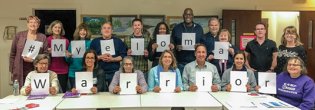
Black Swan Research Initiative® researchers work at locations throughout the world on multiple strategies to treat the different types and stages of multiple myeloma. Black Swan Research Initiative clinical trials seek to detect monoclonal gammopathy of undetermined significance (MGUS)—the precursor to multiple myeloma. These researchers study how to prevent the progression of MGUS. Additionally, clinical trials are being conducted to develop ways to deter resistant disease as well as to identify genetic and environmental risk factors that cause the onset of multiple myeloma.
Core Black Swan Research Initiative Concepts
Understand Disease Onset
By understanding monoclonal gammopathy of undetermined significance (MGUS) and smoldering multiple myeloma (SMM), the Black Swan Research Initiative (BSRI) has focused on the goal of prevention. MGUS is precursor condition; it precedes all cases of SMM and active myeloma. The BSRI has worked to prevent the onset of MGUS. Additionally, the BSRI has begun early intervention for high-risk smoldering multiple myeloma (HR-SMM). This approach prevents disease progression and may potentially cure early active disease. By studying early disease, the BSRI has also focused on identifying genetic and environmental risk factors of myeloma.
Early Intervention
Another one of the BSRI’s primary goals has been to intervene early before the emergence of gene mutations or of immune defects that are linked to treatment resistance. By intervening earlier, patients have a greater likelihood of achieving longer remissions and potential cures. The BSRI has proposed and implemented two “Cure Trials” as pilot efforts. These trials have assessed the best outcomes that are feasible with currently available therapies.
Develop Reliable Minimal Residual Disease (MRD) Testing
To accurately assess the impact of new and improved therapies, myeloma must be tracked at very low levels of disease, also known as minimal residual disease (MRD). To apply such tracking, better MRD testing was required. The BSRI has proposed to fund research to develop better testing capabilities.
Multiple Research Projects at Once
The BSRI team has achieved its first goal: the team has developed a new MRD test that uses flow cytometry. This test is called Next Generation Flow.
MRD testing: Next-Generation-Flow
The BSRI team has defined and overcome the first obstacle to finding a cure for myeloma by developing a very sensitive, reliable, standardized, and affordable test to quantify and characterize any myeloma cells that may remain after a patient is in complete response (CR). The new test, known as Next-Generation Flow (NGF), is a flow cytometry technique paired with a specialized software package developed by researchers in Spain to detect even a single myeloma cell surviving among one million bone marrow cells.
Miniscule amounts of myeloma cells that remain after treatment can cause patients to relapse. The BSRI believes that detecting this minimal residual disease (MRD) through ultra-sensitive NGF technology, then eliminating it through the assertive treatment until MRD-negative is achieved and maintained for five years represent the first step to achieving cure.
In October 2016, 120 researchers from myeloma laboratories around the globe met in Salamanca, Spain. These researchers underwent intensive training in NGF. Researchers from 60 labs in 26 countries worldwide and 12 sites in the U.S. attended the training workshop. The BSRI’s MRD Consortium represents centers in
- Asia
- Africa
- Australia
- Europe
- North America
- South America
Three of the labs in the U.S. are reference labs. Any hospital, clinic, or doctors' office may send a patients’ bone marrow samples for MRD testing to these labs. The labs are located in:
- Mayo Clinic (Rochester, MN)
- Roswell Park Cancer Center (Buffalo, NY)
- SWOG Lab at the Levine Cancer Center (Charlotte, NC)
On March 10, 2017, the journal Leukemia published an article by members of the BSRI team on the design and validation of NGF. With accurate and accessible MRD testing, we have an endpoint to assess deep response.
Cure Trials: CESAR—Treating High-Risk Smoldering Myeloma with a Three-Drug Regimen
Along with the ASCENT and iStopMM clinical trials, the CESAR trials is one of three BSRI-funded “Cure” trials. The CESAR trial is ongoing in Spain with Professor María Victoria Mateos as the Principal Investigator. CESAR uses the combination of Kyprolis, Revlimid, and dexamethasone (KRd) with autologous stem cell transplant in the same setting as ASCENT.
With a median follow-up of 28 months, 94 percent of patients are in remission, with 62 percent having undetected MRD at the 10-6 (zero out of a million cells). It is hoped that the addition of daratumumab in the U.S. ASCENT trial will enhance the undetected MRD level among patients to approximately 80 percent (at 10-6 level). Because the CESAR trial has been well tolerated, there is great optimism moving forward. Although longer follow-up is required, this curative strategy for high-risk SMM is encouraging.
Results of the CESAR trial were published in the journal Blood.
Cure Trials: ASCENT—Treating High-Risk Smoldering Myeloma with a Four-Drug Regimen
The U.S.-based ASCENT trial (Aggressive Smoldering Cure Evaluating Novel Therapies) is headed by Dr. Shaji Kumar of the Mayo Clinic (Rochester, MN). This trial uses a combination of carfilzomib, lenalidomide, dexamethasone, and daratumumab in high-risk smoldering multiple myeloma. Its goal: to learn whether starting treatment early substantially improves outcomes, leads to a higher level of undetected minimal residual disease (MRD), sustained remissions, and potential cure.
All enrolled patients will receive a reduced dose of carfilzomib, lenalidomide, and daratumumab for one year of maintenance. At this point, it is anticipated that approximately 80% of patients will achieve MRD negativity (versus 62% already achieved with KRd in the CESAR trial), said Dr. Brian G.M. Durie. MRD testing will be done at diagnosis and during therapy, allowing intensive tracking of the disease in patients. The number of cycles of therapy will be determined by the individual patient's response.
The ASCENT trial will open for accrual in March 2018 at 12 IMF Consortium sites. Further information may be found here.
iStopMM: A First-of-its-Kind Trial in Multiple Myeloma
The IMF’s BSRI, along with the University of Iceland and deCode Genetics, are currently conducting the iStopMM® project, which stands for Iceland Screens, Treats, or Prevents Multiple Myeloma. Launched in November 2016, iStopMM is the largest population-based screening study for myeloma and its earlier disease precursors that has ever been attempted. Visit iStopMM to learn more about this landmark study.
Combating Resistant Disease
The Black Swan Research Initiative team has taken the first steps to achieve cure for a subset of patients—those who rapidly achieve MRD negativity with currently available therapies. The next challenge is to eliminate residual disease in patients who remain persistently MRD positive, and prevent the development of recurrent resistant disease. Major BSRI efforts are underway to study recurrent and resistant disease, and develop appropriate treatment protocols.
Multiple BSRI-sponsored clinical trials are being set up in the US, Europe, and the Asia-Pacific region to study and treat patients with MRD-positive disease. These studies will use new therapies to attempt to eliminate resistant MRD myeloma cells.
In addition, there are more than 40 BSRI projects under way around the globe to study various aspects of residual disease.
An ongoing study of long survivors will help better characterize and understand the nature of their disease, treatments, and response to treatment.
A Multinational Consortium of Myeloma Experts
The first BSRI project was with the University of Salamanca in Spain. Its aim was to develop the much-needed precise, sensitive, and cost-efficient MRD test known as Next Generation Flow MRD testing. Today, more than 50 projects are occurring to achieve the basic and translational research that is needed to move closer and closer to a cure .





